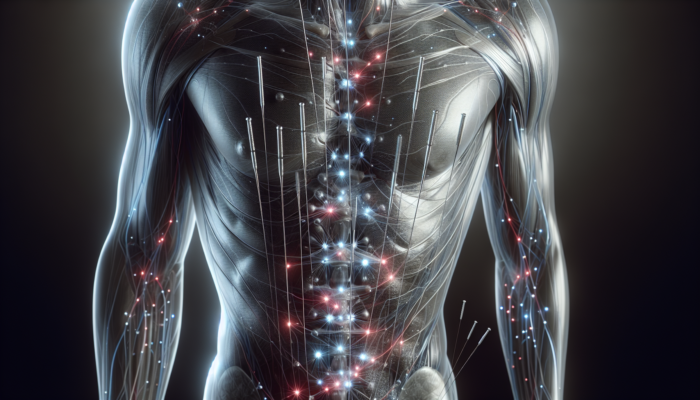Discover How Acupuncture Can Significantly Boost Your Immune System: In-Depth Analysis and Actionable Techniques
The practice of acupuncture for strengthening the immune system has become increasingly popular as more people seek natural and holistic solutions for their health and wellness. Acupuncture, which is a revered traditional Chinese healing technique with a rich history spanning thousands of years, is renowned for its ability to enhance the immune system while fostering overall wellness and vitality. In this comprehensive exploration, we will delve into the mechanisms through which acupuncture enhances immune function, compare traditional versus contemporary practices, and evaluate the role of acupuncture in managing chronic health challenges.
Understanding the Scientific Basis: How Acupuncture Elevates Immune Function

The complex scientific mechanisms that underpin the use of acupuncture for immune system enhancement are both intriguing and multifaceted. Research has demonstrated that acupuncture can effectively stimulate the production of crucial immune cells, such as T-cells and natural killer cells, which are vital in the fight against infections. By strategically inserting needles at specific anatomical locations, acupuncture not only enhances blood circulation but also increases the release of endogenous opioids, leading to a significant improvement in overall health and well-being.
Moreover, numerous studies indicate that acupuncture can positively influence the body’s stress response. Chronic stress is widely recognized as a major factor that can compromise the immune system. Through its ability to lower levels of stress hormones, such as cortisol, acupuncture may enhance the immune response while reducing the likelihood of developing various illnesses. Furthermore, research highlights that acupuncture has anti-inflammatory effects, which can be particularly beneficial for individuals suffering from autoimmune diseases, where an overactive immune system mistakenly attacks healthy cells.
Additionally, a key aspect of acupuncture is its ability to activate the parasympathetic nervous system, often referred to as the “rest and digest” mode. This activation promotes deep relaxation, thereby supporting the body’s natural healing mechanisms and bolstering immune function. Emerging research suggests that the careful application of acupuncture not only yields immediate benefits but also fosters long-lasting positive effects on the immune system.
Comparative Analysis of Traditional and Contemporary Methods for Immune Enhancement: Finding Your Ideal Approach
The ongoing dialogue regarding traditional and modern methods of immune enhancement through acupuncture is rich and intricate. Traditional Chinese Medicine (TCM) perceives the body as a cohesive system, where the flow of Qi, or life energy, must remain unobstructed through meridians. Any disruption in this flow is considered a primary contributor to diseases, and acupuncture is employed to remove these blockages, restoring balance and harmony.
Conversely, modern Western medicine prioritizes measurable outcomes and empirical validation. Within this framework, acupuncture is increasingly acknowledged as a complementary treatment option that can effectively integrate with other medical therapies. Clinical trials have validated the effectiveness of acupuncture in addressing specific health conditions and fortifying the immune system, thereby creating a bridge between these two paradigms.
The assessment of effectiveness often relies on individual preferences and specific health needs. While some patients may align more closely with the holistic principles of TCM, others may prefer an evidence-based medical framework. Ultimately, the most effective approach may involve a harmonious blend of both methodologies to fully capitalize on the advantages of acupuncture for immune system enhancement and overall health promotion.
Understanding the Impact of Acupuncture on Chronic Health Challenges
Chronic conditions such as arthritis, asthma, and autoimmune diseases can exert considerable pressure on the immune system, severely diminishing quality of life. In these instances, acupuncture for immune enhancement can serve as a vital resource. Targeted stimulation of specific acupuncture points not only alleviates symptoms but also strengthens the immune system concurrently.
Acupuncture has proven effective in reducing pain and inflammation associated with chronic conditions. This relief enables the body to redirect its energies toward addressing the underlying disease and enhancing the immune system. Many patients report improved quality of life and a greater ability to manage the challenges presented by their conditions after undergoing acupuncture treatments.
Prevention is another essential consideration. Individuals suffering from chronic conditions often find themselves trapped in a detrimental cycle where their symptoms negatively impact their overall health. Acupuncture for immune enhancement can play a pivotal role in breaking this cycle by promoting holistic health and reinforcing the body’s resilience against future health challenges.
Implementing Acupuncture for Immune System Strengthening: Essential Guidelines for Effective Results

Successfully utilizing acupuncture for immune system enhancement is crucial for maximizing the therapy’s benefits. In this section, we will explore the most frequently used acupuncture points, the ideal duration and frequency of treatments, and how to effectively integrate acupuncture with other therapeutic practices for comprehensive health enhancement.
Key Acupuncture Points Essential for Optimal Immune Function
Identifying the correct acupressure points is vital for achieving the desired therapeutic effects. Some of the most commonly utilized points for immune enhancement through acupuncture include LI4 (Hegu), ST36 (Zusanli), and Ren6 (Qihai).
LI4, located between the thumb and index finger, is frequently employed for pain relief and boosting the body’s natural defenses. ST36, found on the front of the lower leg, has shown remarkable efficacy in increasing overall energy levels and immunity. Ren6, situated in the lower abdomen, is considered a reservoir of vitality in TCM and can aid in reinforcing Qi while stimulating the immune system.
Additionally, other points may be incorporated into treatment based on the individual’s unique condition and symptoms. By combining various points, the effectiveness of the therapy can be amplified, delivering comprehensive support for the immune system. A skilled acupuncturist will evaluate the patient’s specific needs to create a customized treatment plan.
Determining the Optimal Duration and Frequency of Treatments for Immune Support
The duration and frequency of acupuncture treatments for immune enhancement can vary based on individual circumstances and health requirements. Generally, it is advisable to start with a series of 6 to 12 sessions distributed over several weeks. In the beginning, weekly appointments may be beneficial to help the body acclimate to the therapy and to observe early positive changes.
After this initial phase, sessions can be spaced out to every two to four weeks to sustain progress and provide ongoing support for the immune system. During times of elevated stress or during cold and flu seasons, increasing session frequency and scheduling additional appointments may be advisable.
Patients should closely follow their acupuncturist’s recommendations and adjust as necessary to achieve the best possible results. When combined with a healthy lifestyle and balanced nutrition, acupuncture for immune enhancement can have a profound impact on an individual’s health trajectory.
Maximizing Results by Integrating Acupuncture with Other Therapeutic Modalities

Combining acupuncture for immune enhancement with additional therapeutic approaches can significantly amplify the treatment’s effectiveness. Many patients find that integrating acupuncture into a comprehensive health strategy, which may include nutritional counseling, physical therapy, and stress management, provides substantial benefits to their overall wellness.
A well-balanced diet is essential, as certain foods can strengthen the immune system. A diet rich in antioxidants, vitamins, and minerals enhances the effects of acupuncture while promoting overall health.
Furthermore, pairing acupuncture with relaxation methods such as yoga or meditation can facilitate stress management and enhance the efficacy of acupuncture. Stress is a known factor that can weaken the immune system, and by utilizing stress management techniques, patients can significantly improve their health outcomes.
The synergistic relationship between acupuncture and other therapies should not be underestimated. Collaborating with various health professionals can provide patients with a holistic treatment experience that enhances their health and well-being.
Unpacking the Immune-Strengthening Effects of Acupuncture Across Varying Age Groups
The benefits of acupuncture for immune enhancement span individuals of all ages. This section will explore the specific advantages and necessary precautions for children, adults, and senior citizens.
Acupuncture for Children: Tailored Benefits and Safety Considerations
The application of acupuncture for children necessitates special attention, as treatment techniques and the selection of acupuncture points must be modified to suit the unique needs of younger patients. Nonetheless, acupuncture can be a highly effective approach for enhancing children’s immune systems, particularly when addressing recurrent colds and other respiratory illnesses.
A gentler method known as “acupressure” can be particularly effective for children, as it does not involve needles yet still provides comparable health benefits. After undergoing acupuncture treatments, parents frequently notice significant improvements in their children’s health and overall well-being.
It is crucial to choose a qualified acupuncturist with expertise in treating children. The potential benefits of pain relief, immune system enhancement, and improved well-being are key considerations for parents contemplating acupuncture for their children.
Acupuncture for Adults: Focus on Prevention and Holistic Treatment
Adults can reap significant advantages from acupuncture for immune enhancement, not only for alleviating current conditions but also for proactive health maintenance. In today’s fast-paced and stressful environment, many adults find themselves increasingly susceptible to illnesses, and acupuncture can effectively strengthen the immune system while promoting overall health.
Regular acupuncture treatments can boost immune defense, reduce stress, and enhance quality of life. Research has shown that adults who integrate acupuncture into their health routines experience fewer instances of respiratory illnesses and demonstrate improved stress management capabilities.
Additionally, acupuncture provides crucial support for chronic conditions such as allergies, asthma, and autoimmune diseases. By alleviating inflammation and stabilizing the immune system, acupuncture offers valuable assistance for adult health and wellness.
Acupuncture for Seniors: Improving Quality of Life and General Health
Utilizing acupuncture to bolster immune function among senior citizens can provide numerous advantages, particularly regarding their quality of life. Older adults often face heightened vulnerability to illnesses and infections, and acupuncture can play a vital role in strengthening their immune defenses while promoting overall health.
Acupuncture has been shown to effectively relieve pain and inflammation that commonly accompany aging. This relief can significantly enhance mobility and overall well-being for seniors, empowering them to enjoy a more active and independent lifestyle.
Furthermore, acupuncture can boost mood and alleviate stress, which is essential for maintaining mental health in older adults. Both physical and psychological wellness are critical components in fostering well-being during later years. Seniors who include acupuncture in their health routines often report elevated energy levels and an enhanced quality of life.
Highlighting the Immune System Strengthening Effects of Acupuncture: Real-Life Case Studies and Success Stories
Examining case studies and personal success stories can effectively showcase the transformative power of acupuncture for immune enhancement. These real-life examples illustrate how acupuncture has positively influenced individuals facing various health challenges, underscoring its potential benefits for the immune system.
Case Study: Acupuncture’s Impact on Managing Autoimmune Disorders
One compelling case study involved a patient diagnosed with an autoimmune condition marked by persistent inflammation and discomfort. After undergoing a series of acupuncture treatments, the patient reported a notable reduction in symptoms and an improved quality of life. The targeted stimulation of specific acupuncture points effectively helped to regulate the immune response and alleviate inflammatory processes within the body.
This case highlights how acupuncture can act as a complementary therapy for individuals dealing with autoimmune diseases, relieving symptoms while promoting overall wellness. Patients who incorporate acupuncture into their treatment plans often achieve better control over their conditions and experience a decreased need for stronger medications.
Another inspiring story features a woman who often battled colds and respiratory illnesses. After adding acupuncture to her health regimen, she noticed a significant decrease in the frequency of her illnesses and a quicker recovery time. The acupuncture treatments substantially enhanced her immune system and improved her overall health.
This success narrative emphasizes how acupuncture for immune enhancement can be an effective strategy for both treatment and preventive health maintenance. Many patients report fewer occurrences of colds and increased vitality following regular acupuncture sessions.
Long-Term Research: Lasting Benefits of Acupuncture for Immune Health
Longitudinal studies regarding acupuncture for immune enhancement have demonstrated that positive effects can persist over extended periods. One notable study revealed that patients receiving acupuncture over prolonged durations exhibited significant improvements in their immune response and a reduced vulnerability to various illnesses.
These findings indicate that consistent acupuncture not only delivers immediate benefits but also contributes to the long-term fortification of the immune system. The enduring effects of this therapy may lead to improved overall health and well-being for years, ultimately enhancing quality of life.
Addressing Common Questions About Acupuncture for Immune Enhancement
Is Acupuncture Painful?
In general, acupuncture is not perceived as painful. The needles used are extremely fine and inserted with precision. Some individuals may feel mild sensations of pulling or pressure, which are typically normal and well-tolerated.
How Quickly Can Results Be Observed?
Results can vary based on individual circumstances and health conditions. Some patients may notice improvements after just one session, while others may need multiple treatments to achieve significant progress.
Are There Risks or Side Effects Associated with Acupuncture?
Acupuncture is considered safe when administered by a qualified practitioner. Possible side effects may include mild discomfort at the needle insertion sites or temporary fatigue, both of which usually resolve quickly.
What is the Recommended Frequency of Acupuncture for Immune Enhancement?
A commonly suggested approach is to undergo treatment once a week for a series of 6 to 12 sessions, followed by monthly maintenance sessions tailored to individual needs and objectives.
Can Acupuncture Be Combined with Other Treatment Modalities?
Absolutely, acupuncture can be seamlessly integrated with other therapies such as physical therapy, massage, or nutritional counseling to maximize overall health benefits.
What is the Typical Duration of an Acupuncture Session?
A standard acupuncture session usually lasts between 30 to 60 minutes, although the exact duration may vary based on the patient’s specific needs.
Is Any Special Preparation Necessary Prior to Acupuncture?
It is advisable to arrive well-hydrated for the session and to have a light meal beforehand. Additionally, avoiding alcohol or caffeine shortly before treatment is recommended.
Can Everyone Safely Receive Acupuncture?
Most individuals are suitable candidates for acupuncture; however, pregnant women, individuals with certain medical conditions, or those with blood clotting disorders should consult their healthcare provider prior to treatment.
How Can I Find a Qualified Acupuncturist?
Seek out an acupuncturist with appropriate training and certification. Recommendations from trusted friends or healthcare professionals can also be invaluable.
What is the Average Cost of an Acupuncture Session?
Costs can vary based on location and the practitioner’s expertise. Typically, prices range from 40 to 100 pounds per session, with some insurance plans covering acupuncture treatments.
Connect with us on Facebook!
The Article: Acupuncture for Immune System Enhancement appeared first on https://mcrtherapies.co.uk
The Article Acupuncture Boosts Immune System Health appeared first on https://mcrtherapies.com
The Article Acupuncture Enhances Immune System Functionality Was Found On https://limitsofstrategy.com



